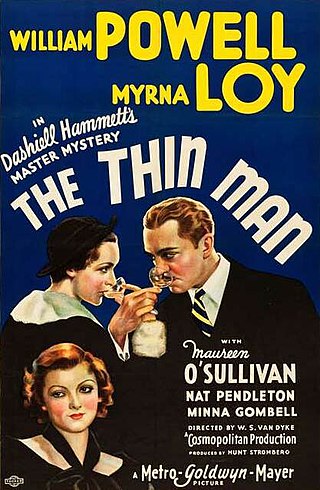
The Thin Man is a 1934 American pre-Code comedy-mystery film directed by W. S. Van Dyke and based on the 1934 novel of the same name by Dashiell Hammett. The film stars William Powell and Myrna Loy as Nick and Nora Charles, a leisure-class couple who enjoy copious drinking and flirtatious banter. Nick is a retired private detective who left his very successful career when he married Nora, a wealthy heiress accustomed to high society. Their wire-haired fox terrier Asta was played by canine actor Skippy. In 1997, the film was added to the United States National Film Registry having been deemed "culturally, historically, or aesthetically significant".
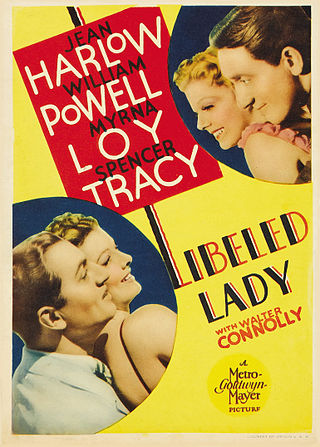
Libeled Lady is a 1936 American screwball comedy film directed by Jack Conway and starring Jean Harlow, William Powell, Myrna Loy and Spencer Tracy. It was written by George Oppenheimer, Howard Emmett Rogers, Wallace Sullivan, and Maurine Dallas Watkins. This was the fifth of fourteen films in which Powell and Loy were teamed, inspired by their success in the Thin Man series.

Father of the Bride is a 1950 American romantic comedy film directed by Vincente Minnelli from a screenplay by Frances Goodrich and Albert Hackett, based on the 1949 novel of the same name by Edward Streeter. The film stars Spencer Tracy, Joan Bennett, and Elizabeth Taylor, and follows a man trying to cope with preparations for his daughter's wedding. Father of the Bride was nominated for Academy Awards for Best Picture, Best Writing, Screenplay, and Best Actor in a Leading Role.

The Thin Man Goes Home is a 1944 American comedy mystery film directed by Richard Thorpe. It is the fifth of the six Thin Man films starring William Powell and Myrna Loy as Dashiell Hammett's dapper ex-private detective Nick Charles and his wife Nora. The supporting cast includes Lucile Watson, Gloria DeHaven and Helen Vinson. This entry in The Thin Man series was the first not directed by W.S. Van Dyke, who had died in 1943.
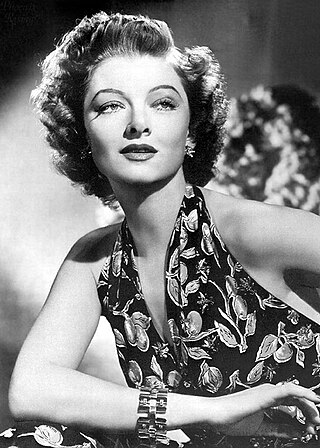
Myrna Loy was an American film, television and stage actress. As a performer, she was known for her ability to adapt to her screen partner's acting style.

Manhattan Melodrama is a 1934 American pre-Code crime drama film, produced by MGM, directed by W. S. Van Dyke, and starring Clark Gable, William Powell, and Myrna Loy. The movie also provided one of Mickey Rooney's earliest film roles. The film is based on a story by Arthur Caesar, who won the Academy Award for Best Original Story. It was also the first of Myrna Loy and William Powell's fourteen screen pairings.

Woodbridge Strong Van Dyke II was an American film director who made several successful early sound films, including Tarzan the Ape Man in 1932, The Thin Man in 1934, San Francisco in 1936, and six popular musicals with Nelson Eddy and Jeanette MacDonald. He received two Academy Award nominations for Best Director for The Thin Man and San Francisco, and directed four actors to Oscar nominations: William Powell, Spencer Tracy, Norma Shearer, and Robert Morley. Known as a reliable craftsman who made his films on schedule and under budget, he earned the name "One Take Woody" for his quick and efficient style of filming.

Double Wedding is a 1937 American screwball romantic comedy film starring William Powell and Myrna Loy, and featuring Florence Rice, John Beal, Jessie Ralph, and Edgar Kennedy. This was the seventh pairing of Powell and Loy, with another seven to go. It was directed by Richard Thorpe from a screenplay by Jo Swerling based on the unpublished play Nagy szerelem by Ferenc Molnár.

Ship Ahoy is a 1942 American musical-comedy film directed by Edward Buzzell and starring Eleanor Powell and Red Skelton. It was produced by MGM.
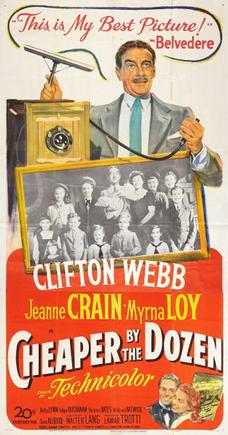
Cheaper by the Dozen is a 1950 American comedy film based upon the autobiographical book Cheaper by the Dozen (1948) by Frank Bunker Gilbreth Jr. and Ernestine Gilbreth Carey. The film and book describe growing up in a family with twelve children, in Montclair, New Jersey. The title comes from one of Gilbreth's favorite jokes, which played out in the film, that when he and his family were out driving and stopped at a red light, a pedestrian would ask: "Hey, mister! How come you got so many kids?" Gilbreth would pretend to ponder the question carefully, and then, just as the light turned green, would say: "Well, they come cheaper by the dozen, you know", and drive off.

The Ghost Breakers is a 1940 American mystery/horror comedy film directed by George Marshall and starring Bob Hope and Paulette Goddard. It was adapted by screenwriter Walter DeLeon as the third film version of the 1909 play The Ghost Breaker by Paul Dickey and Charles W. Goddard.
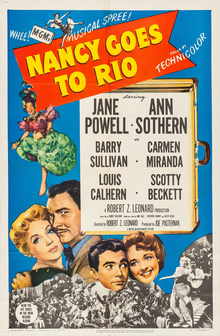
Nancy Goes to Rio is a 1950 American Technicolor musical-comedy film directed by Robert Z. Leonard and produced by Joe Pasternak from a screenplay by Sidney Sheldon, based on a story by Jane Hall, Frederick Kohner, and Ralph Block. The music was directed and supervised by George Stoll and includes compositions by George and Ira Gershwin, Giacomo Puccini, Jack Norworth, and Stoll.

Edison, the Man is a 1940 biographical film depicting the life of inventor Thomas Edison, who was portrayed by Spencer Tracy. Hugo Butler and Dore Schary were nominated for the Academy Award for Best Writing, Original Story for their work on this film. Typical of most Hollywood biopics, much of the film fictionalizes or exaggerates the real events of Edison's life.
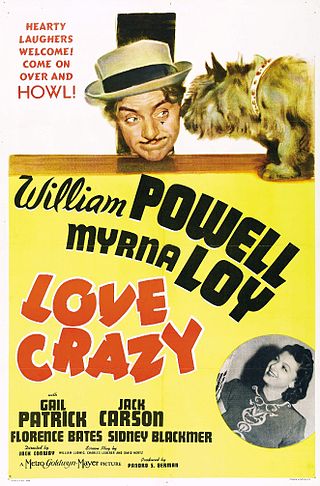
Love Crazy is a 1941 American screwball comedy film directed by Jack Conway and starring William Powell, Myrna Loy and Gail Patrick. Powell and Loy play a couple whose marriage is on the verge of being broken up by the husband's old girlfriend and the wife's disapproving mother. This was the eleventh of fourteen films in which they appeared together. The supporting cast includes Jack Carson and Sig Ruman.

William Horatio Powell was an American actor, known primarily for his film career. Under contract with Metro-Goldwyn-Mayer, he was paired with Myrna Loy in 14 films, including the Thin Man series based on the Nick and Nora Charles characters created by Dashiell Hammett. Powell was nominated for the Academy Award for Best Actor three times: for The Thin Man (1934), My Man Godfrey (1936), and Life with Father (1947).
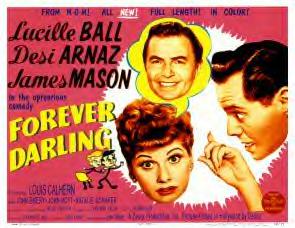
Forever, Darling is a 1956 American fantasy romantic comedy film directed by Alexander Hall, written by Helen Deutsch, and starring Lucille Ball, Desi Arnaz, and James Mason. In the film, Ball stars as a wife who tries to save her struggling marriage to a chemical engineer (Arnaz) with the help of her guardian angel (Mason). Louis Calhern and Natalie Schafer co-star in supporting roles.
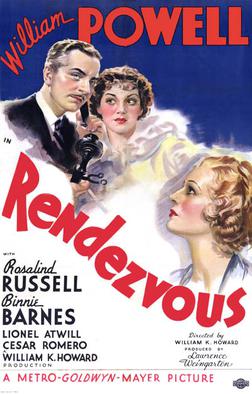
Rendezvous is a 1935 American spy film set in World War I, directed by William K. Howard, starring William Powell and Rosalind Russell and featuring Binnie Barnes, Lionel Atwill, Cesar Romero and Samuel S. Hinds. Powell plays an American cryptologist who tangles with German spies while falling in love.

The Red Pony is a 1949 American Technicolor drama film directed by Lewis Milestone and starring Myrna Loy, Robert Mitchum and Louis Calhern. It is based on John Steinbeck's 1937 novella of the same name. Steinbeck also wrote the screenplay for this film. It was distributed by Republic Pictures.

Whipsaw is a 1935 American crime drama film directed by Sam Wood and starring Myrna Loy and Spencer Tracy. Written by Howard Emmett Rogers, based on a story by James Edward Grant, the film is about a government agent working undercover traveling across the country with an unsuspecting woman, hoping she will lead him to her gang of jewel thieves. The film was produced by Harry Rapf for Metro-Goldwyn-Mayer, and was released on December 18, 1935, in the United States.
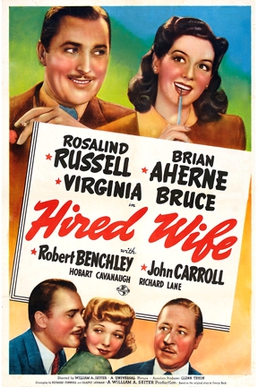
Hired Wife is a 1940 American romantic comedy film directed by William A. Seiter and starring Rosalind Russell, Brian Aherne and Virginia Bruce.



















